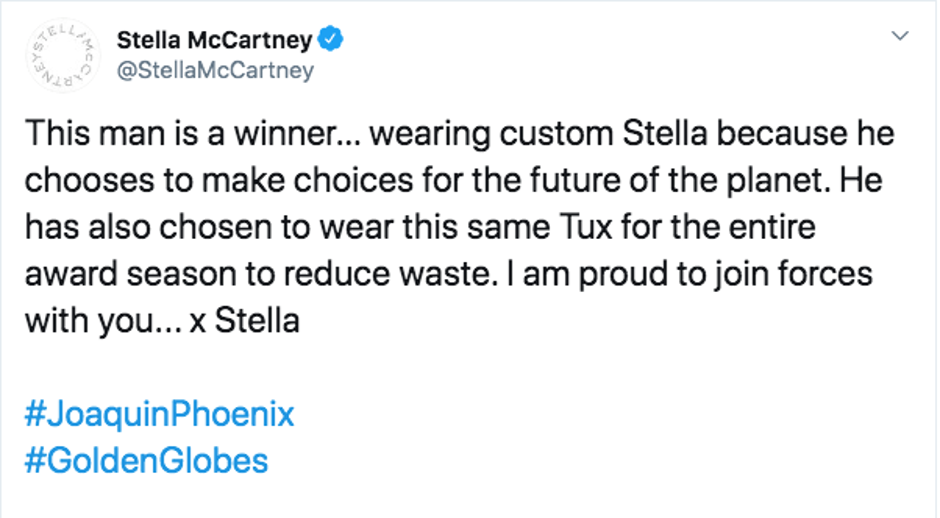No Buy Year spells trouble for marketers

- 14 February 2020
At a time of mass confusion around ethical consumption, might the answer be to give up buying new altogether? Morag Cuddeford-Jones wonders if there might be a less extreme solution that limits the cost to businesses.
We have hit peak award season where clouds of tulle, organza and taffeta vie for a gong and occasionally we might catch a glimpse the human inside. It also signals the moment we could have completely lost touch with what might be considered responsible consumerism: designer Stella McCartney tweeted fulsome praise for client and much-fancied award-gatherer, Joaquin Phoenix, announcing that – shock - he will be wearing the same tux for the whole season. Imagine!


Somewhat predictably, there was an internet pile-on. Commenters suggested that trotting out the same tux at a handful of events over a couple of months wasn’t exactly peak Greta Thunberg. But, even if it was remarkably cack-handed, it does show that an eco-conscience is creeping into even the most conspicuously consumerist corners.
At the other end of the scale, we have supporters of Oxfam’s Second Hand September and now 2020’s marathon version, the No Buy Year. The latter exhorts as many people as possible to give up buying ‘stuff’ for a whole 365 days. Originally a niche activity promoted by the odd YouTuber, this sort of statement activism is gathering momentum. This could be good news for our wallets and the planet, but a little alarming for an already beleaguered retail sector.
Headline writers haven’t minced their words. Retail Gazette declared 2019 the “worst Christmas ever”, with overall sales down 0.1% compared to 1.2% growth in 2018. Analysts suggested that consumers were becoming “more cautious and conscientious” with their spending.
Could a No Buy Year really take off and flatten retailers as a result? One woman allegedly saved £22,000 by sticking hard and fast to the ‘essentials-only’ rule. If we were to apply that to the working population of the UK – the most likely to be spending on more than essentials – it could take a massive £716bn out of the economy, nearly double the entire £372.24bn value of the retail sector in 2019.
Clearly, such an extreme is unlikely to happen at scale but marketers must be alive to the fact that consumers are increasingly concerned by unnecessary consumption and are looking around for alternatives. It’s a flourishing trend for start-ups ready to rent out everything from cars to everyday office wear – Australia’s Glamcorner covers every eventuality from one-off event hire to subscription packages for a rotating wardrobe of interesting and designer pieces.
But even then, there are questions over how sustainable renting is, given the transportation and washing involved. This relentless self-questioning about whether or not we as shoppers are doing the right thing is leading to a growing tribe termed by Sarah Duncan, author of The Ethical Business Book, as the ‘conflicted consumer’.
“I frequent a salad bar outside my gym but as I’ve become more conscious of my consuming and looking at single use plastics, I’ve become increasingly resentful every time I visit it because my healthy salad comes in a plastic bowl. I currently still visit the bar, but a bit less and I know that the minute someone comes along that offers a more ethical product with similar quality and convenience – I’m not prepared to walk another 10 minutes – my local won’t see me for dust. On paper I’m a loyal customer, but really, I’m anything but.”
Duncan acknowledges that consumers aren’t simply going to stop shopping, but this growing resentfulness has the potential to be a powerful force for change and brands that don’t find a way to address it will eventually become extinct. How many of your customers might well be waiting to switch products and looking for a sign from you that they should not? Conversely, how many of these changeable customers might your business be able to capture?
This doesn’t mean that these brands have to become sustainable champions overnight; working out the most sustainable and ethical methods of production, transportation, retail and disposal is still an epic task. However, they should seriously consider making a start:
“It is a very fine line,” Duncan adds, “but there is an element of education. Brands going in the right direction need to educate on product use and product disposal. If you can encourage people to buy something a little bit more expensive and educate them on how to use it for as long as possible, followed by responsible disposal, then you are showing some responsibility without saying don’t buy my product.”
CIM members can hear more from Sarah Duncan and The Ethical Business Book in Issue 3 of Catalyst magazine, out Summer 2020.
To discover more content around sustainable marketing and the consumption crisis, check out our brand new sustainable transformation hub.

- 0 views

 FAQs
FAQs
 Log in
Log in
 MyCIM
MyCIM





